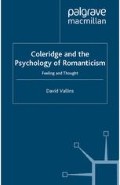Abstract
Coleridge’s repeated claim that thought depends on intuition or feeling, and that philosophical insight can only be derived from personal conviction, raises obvious questions as to how one should distinguish a ‘true’ or revelatory conviction from a false one.1 His continual quest for a feeling of the sublime is rationalized as a pursuit of fundamental truths which are beyond human understanding; yet the very impossibility of demonstrating these truths reveals their dependence on Coleridge’s will to believe in them, or on his search for a sublime feeling which is essentially a substitute for any form of argument. Similarly, his preoccupation with Neoplatonic theories of the upward movement of nature and intellect towards union with the deity seems to have been motivated by a desire not only to establish grounds for an optimism which his practical circumstances tended to undermine, but also to celebrate the intellectual efforts which he evidently found so rewarding.2 To say that his philosophical writing proposes ‘the communication and acquirement of truth’ as its ‘immediate object’ would therefore seem to involve too uncritical an acceptance of his metaphysical conclusions.3
Access this chapter
Tax calculation will be finalised at checkout
Purchases are for personal use only
Preview
Unable to display preview. Download preview PDF.
Notes
On the compensatory nature of Coleridge’s philosophical optimism see especially John Colmer, ‘Coleridge and the Life of Hope’, SR, 2 (1972) 332.
On Coleridge’s view of faith as ‘a special form of active knowledge … gained by active exercise of “the free will, our only absolute self”, see James Engell, ‘Coleridge and German Idealism: First Postulates, final Causes’, Richard Gravil and Molly Lefebure (eds), The Coleridge Connection: Essays for Thomas McFarland (London: Macmillan, 1990), 158.
Richard Baxter, Preservatives Against Melancholy and Overmuch Sorrow: Or the Cure of Both by Faith and Physick (London, 1713), 20.
My use of the term ‘sublimation’ is suggested by Weiskel, who uses it to connect the movement of transcendence involved in the sublime both with the Freudian sense of the term (i.e. a transition from physical satisfactions to emotional ones) and with ‘the usual sense of the word in chemistry, i.e., the direct passage from a solid to a gaseous state’. See Thomas Weiskel, The Romantic Sublime: Studies in the Structure and Psychology of Transcendence (Baltimore, MD: Johns Hopkins UP, 1976), 31.
And as they have done, indeed. See especially Beverly Fields, Reality’s Dark Dream: Dejection in Coleridge (Kent, OH: Kent State UP, 1967), 101–18.
Coburn, indeed, suggests that Coleridge’s defence of minds such as Boehme’s ‘was aroused more by sympathetic psychological understanding than by any agreement in mystical opinions’ (Inquiring Spirit: A New Presentation of Coleridge From His Published and Unpublished Writings, ed. Kathleen Coburn [London: Routledge, 1951], 16). See also AR, 393–4, where Coleridge describes how a mystic whose gifts have been ‘developed and displayed by all the arts of Education and favorable Fortune’ will recognize that ‘the delightful Dream’ recorded by authors such as Boehme ‘is a Dream of Truth’.
Shaftesbury, whose discussion of ‘enthusiasm’ bears important resemblances to Coleridge’s analysis of Boehme, nevertheless admits the difficulty of making this distinction. Enthusiasm, he says, ‘is a matter of nice Judgment, and the hardest thing in the world to know fully and distinctly. … Nor can Divine Inspiration, by its outward Marks, be easily distinguish’d from it. For Inspiration is a real feeling of the Divine Presence, and Enthusiasm a false one’ (Shaftesbury, A Letter Concerning Enthusiasm [London, 1708], 80–1).
On Coleridge’s theory of desynonymy see especially Paul Hamilton, Coleridge’s Poetics (Oxford: Blackwell, 1983), 62–88.
This distinction may have been suggested by Cudworth’s statement that in geometry as in religion ‘mere speculation and dry mathematical reason’ are not always sufficient to enforce belief, yet that there is ‘a certain higher and diviner power in the soul’ — the power of faith — whose insight is secure and unquestionable. See Ralph Cudworth, The True Intellectual System of the Universe, ed. J. Harrison (3 vols, London: Thomas Tegg, 1845), 1: xlv.
S.T. Coleridge and R. Southey, Omniana, or Horae Otiosiores, ed. Robert Gittings (Fontwell: Centaur, 1969), 329.
Friend, 1: 106. The last three ‘obscure ideas’ listed here are precisely those which Kant describes as ‘the proper object’ of metaphysical inquiry (CPR, 325n.), and whose moral importance he emphasizes in the Critique of Practical Reason (see Immanuel Kant, Critique of Practical Reason, trans. Lewis White Beck [Chicago: University of Chicago Press, 1949], 234–6).
Author information
Authors and Affiliations
Copyright information
© 2000 David Vallins
About this chapter
Cite this chapter
Vallins, D. (2000). The Feeling of Knowledge: Insight and Delusion in Coleridge. In: Coleridge and the Psychology of Romanticism. Palgrave Macmillan, London. https://doi.org/10.1057/9780230288997_4
Download citation
DOI: https://doi.org/10.1057/9780230288997_4
Publisher Name: Palgrave Macmillan, London
Print ISBN: 978-1-349-40900-6
Online ISBN: 978-0-230-28899-7
eBook Packages: Palgrave Literature & Performing Arts CollectionLiterature, Cultural and Media Studies (R0)

